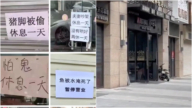【新唐人2014年08月21日訊】近幾年,中國房地產泡沫即將破滅的預言不絕於耳,一座一座的「空城」、「鬼城」隨處可見,但工薪階層和蝸居地下室、以及城市地下井的底層民眾,面對高昂的房價只能望而卻步。為了實現「居者有其屋」,日前,中國民間人士發起了佔房運動。
8月中旬,北京憲政學者陳永苗、香港《太平洋月刊》總編輯歐陽勁、北京季先生、寧波民間人士佘禎韜以及山東民間人士喬小飛、徐寧康等人,來到山東煙臺福山區派出所對面的「鬼城」——福地尚苑小區,展開了首次佔房運動。
20號,陳永苗在接受《新唐人》採訪時表示,他們的首輪佔房運動已結束,接下來將開展第二輪。他認為,中國幾十年的經濟發展,幾乎所有的社會問題,民生問題都是以房子為中心,他們希望通過「佔房運動」,讓居者有其屋。
北京憲政學者陳永苗:「我們好多人一輩子打工賺的錢都花在房子上,可能大部分人還是房奴,所以將來如果說爆發社會革命運動,它還是以房子為中心來爆發的,所以我覺得我們應該提前來預備準備這項工作,而且在中國大量進入城市,被城市化的很多的農民工、蟻族,他都需要有房子。」
但是,那些工薪階層以及蝸居在地下室和城市地下井的貧困群體 ,面對高昂的房價只能望而卻步。而富裕階層和權貴們囤積多處房產,長年閑置。陳永苗表示,從這個意義上來講,佔房運動是對底層民眾權益的救濟方式。
香港獨立研究機構「剖析中國」的創辦人之一塔洛克曾指出,中共各級政府大力招商引資的開發區,像是河南省鄭州市鄭東新區、內蒙古的鄂爾多斯等新市鎮,充滿著無人辦公與居住的大樓建築。這些樓房幾乎都賣給了中產階級,他們卻很難順利脫手。這種充斥著「有人買、沒人住」的新興城市,中國每年還會持續增加12到24個。
另一方面,中國底層百姓不僅買不起住房,為了配合當局「推進城鎮化」的腳步,還必須讓出自己房屋,淪為無房戶或蝸居者。陳永苗指出,即便數以千萬計的底層民眾想儘快擁有自己的房產,但他們也買不起。
陳永苗:「它很多的房價是為政府買單的,它實質上是一個顯示公平或不公平的一種契約,所以需要一種社會運動來校正這種社會爭議,校正這種社會不正義,校正這種財產掠奪的行為。」
大陸經濟學者溫克堅曾刊發文章,呼籲「年輕人,去佔領那些荒漠鬼城」,他認為,佔房運動對一個結構固化,大量住房資源處於閑置和浪費狀態的社會,可以說是一種可供選擇的反抗機制。
陳永苗:「我們現在佔的主要是想佔『鬼城』,沒人住的『鬼城』﹔還有一個想發動群眾去佔貪官房子;第三個,房奴 ,他不是碰到經濟危機,他下崗了他就沒錢了,他就要被銀行把房子收走,這種房子我們覺得也應該是要支持他們,房子要佔領嘛。」
陳永苗表示,佔房運動只佔使用權,不佔所有權。大陸維權律師唐吉田表示,從法律角度講,這種運動不構成犯罪,還能對社會分配正義和住房不公起到自發矯正的作用。
大陸維權律師唐吉田:「風險的話,最多可能會被羅織一些罪名,或者是輿論上的抹黑,或者其他一些方法對群眾一些壓制,當然目前我了解的情況還沒有實際上的這種反應,可能還取決於後續的規模和波及面。」
陳永苗披露 ,目前他們已有一個100多人的佔房運動群,接下來他們會建一個佔房運動網,然後成立一個律師團,如果真有人因佔房被抓可以做辯護。
記者編輯/李韻 後製/鍾元
Ghost Towns are everywhere in China
People Launch Occupancy Campaign
In recent years, the prophecy of the China real estate bubble
burst is never ending, the empty ghost towns are everywhere.
However, the working-class grassroots people who are
living in the urban underground have to prohibitively
face the high real estate price.
To achieve the home ownership, recently, Chinese civil
people initiated the occupancy movement.
In mid-August, Beijing constitutional scholar Chen Yongmiao,
Hong Kong Pacific Magazine editor Ou Yangjin, Mr. Ji in
Beijing, Ningbo SHE Zhentao and Shangdong Qiao Xiaofei,
Xu Ningkang launched its first occupancy movement at the
ghost town facing the Fushan police station in Yantai.
August 20, Chen Yongmiao told NTD that they will start
the second round occupancy campaign because the
first round has ended.
He believes that almost all social problems, livelihood issues
from China’s economic development of the last decades
are house-centered.
They hope to realize home ownership
through occupancy movement.
Chen Yongmiao: lots of people still become mortgage slaves
even though they have been working a lifetime for their house.
So if the social revolutionary movement outbreaks in the
future, it might be still house-centered.
I think we should prepare in advance.
Plus in China, lots of urbanized farmers and tribes need
houses after having migrated to the city.
However, those working-class and poor people in the basement
and urban underground wells are still prohibitive in facing
high house prices.
The wealthy and powerful people have been hoarding many idle properties for a long time.
Chen Yongmiao said the occupancy movement is the remedy
to underlying public interests.
One of Hong Kong’s independent research institution founder’s
Tulloch has pointed out that the development zones are
invested in because of each government’s promotion, are full
of empty office buildings and houses.
These include Zheng Dong New Area in Henan Province and a
new town in Ordos in the Inner Mongolia.
These buildings are almost sold to the middle class, but they
find it difficult to sell.
In China, such purchased but unoccupied new cities will
continue to increase by 12 to 24 per year.
On the other hand, the underclass cannot afford housing and
become homeless or accept a small flat by conceding their own
houses to cooperate with the authorities on urbanization.
Chen Yongmiao pointed out that even if tens of millions of
underclass want to own their own property as soon as possible,
they still cannot afford it.
Chen Yongmiao: The government actually pay the bill
for real estate.
It is an actual contract to show that it’s fair or unfair.
So we need a social movement to correct such social
controversy and the property predatory behavior.
Mainland economist Wen Kejian has published articles calling
on the young people to occupy those empty ghost town.
He believes, the occupancy movement is a selective resistance mechanism to act against a large idle and wasted
housing resources in state.
Chen Yongmiao: We mainly occupy the ghost town, the
unoccupied ghost town.
We also want to mobilize the masses to occupy
the corrupt houses.
Thirdly, we should support mortgage slaves who are homeless
because they were laid off and lost their houses to the banks.
Chen Yongmiao said the occupancy movement would only take
the user’s right not the ownership.
Mainland human rights lawyer Tang Jitian said, from a legal
point, this movement does not constitute a crime but also
corrects the social injustice and unfair
housing allocation spontaneously.
Mainland human rights lawyer Tang Jitian: the most risks
might be some trumped up charges, discrediting by public
opinion, or some other way for massive repression.
Of course, based on my current understanding, there is no such
reaction so far.
It might depend on the subsequent scale and affect.
Chen Yongmiao disclosed that they have more than 100
people to participate in the occupancy movement.
Then they will construct a website for the movement and set
up a lawyer team in case someone is arrested because
of the movement.
Interview & Edit/LiYun Post-Production/ZhongYuan





























